|
|
|
Sort Order |
|
|
|
Items / Page
|
|
|
|
|
|
|
| Srl | Item |
| 1 |
ID:
087519
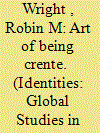

|
|
|
|
|
| Publication |
2009.
|
| Summary/Abstract |
The central objectives of this article are to describe and analyze the Baniwa Art Project, a sustainable development project based on intensive production and commercialization of basketwork, which the Baniwa Indians of the Northwest Amazon (population approximately 12,000), with the assessment of the SocioEnvironmental Institute (ISA), a major NGO in Brazil, launched in the late 1990s. The goals of this project were to enhance the value of the Baniwa basket-making tradition, increase production within the limits of the sustainable use of natural resources, generate income for indigenous producers and their political associations, and train indigenous leadership in the skills of business management. This very successful project was initiated shortly after the creation of the Indigenous Organization of the I ana River Basin (OIBI) and essentially involves 16 of the more than 100 Baniwa communities of the I ana River and its tributaries in Brazil. This article reflects on how young Baniwa evangelical political leaders, with the support of the NGO, promoted the rise of individualism, as well as the introduction of Western values of economic and political success. This generated conflicts with more "traditional" values and practices of egalitarianism producing an increase of witchcraft accusations. The case of a young Baniwa leader who coordinated both the political association and the Art Project illustrates extremely well the sorts of grave conflicts that emerged. This article will also reflect on modifications in human/spirit relations following the introduction of evangelicalism and sustainable development projects. For this, I shall cite extensively from a recent interview I conducted with a Baniwa political leader regarding his perceptions of the relations between evangelicalism, the political movement, and the meanings for the Indians of the notion of "sustainable development."
|
|
|
|
|
|
|
|
|
|
|
|
|
|
|
|
| 2 |
ID:
087516
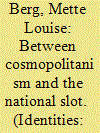

|
|
|
|
|
| Publication |
2009.
|
| Summary/Abstract |
Although cosmopolitanism used to be associated with Western, elite practices, it has in recent years been used to describe a wider array of practices by non-elite and non-Western groups. This article explores the cosmopolitanism of Cuba's "children of the revolution" living in Spain. They are those now young adults who were born in Cuba after the revolution and who were brought up to become the socialist New Man. Theirs was a world of socialist cosmopolitanism, which simultaneously was infused with commitment to a national, territorially-based political project: an independent, socialist Cuba. However, some of these New Men and New Women now embrace ideals of cosmopolitan individualism rather than the patriotic socialism with which they were inculcated as children. Yet the cultural tools that the children of the revolution make use of in their practices and narratives of cosmopolitanism paradoxically point back to revolutionary Cuba. The article argues that cosmopolitanism as a lived practice owes to experiences within the Cuban socialist-national project and is in effect a response to the ineffectiveness of this project, not necessarily a substantive opposition to it. Social capital and habitus deriving from Cuban socialism gave the children of the revolution the desire to attain cosmopolitanism as part of their life-projects. This finding suggests that the relationship between nationalism and cosmopolitanism needs further rethinking.
|
|
|
|
|
|
|
|
|
|
|
|
|
|
|
|
| 3 |
ID:
087517
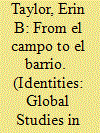

|
|
|
|
|
| Publication |
2009.
|
| Summary/Abstract |
In the social imaginaries of the Dominican Republic, national culture has its origins in el campo, the countryside. Country spaces and country people are viewed as embodying the past in the present, making them authentic contemporary carriers of national culture and moral order. By contrast, the city has long been viewed as the site of a modernity that takes its inspiration from outside of the nation but also as a site of social degeneration. In recent decades, representations of poor barrios as a threat to the city's moral order have intensified in reaction to rising crime rates and a series of economic crises. First generation migrants from the country to the city find that their status as carriers of culture and morality is compromised. They evoke positive memories of their rural pasts to position themselves as moral beings transposed to a corrupt urban milieu. At the same time, they develop urban identities that incorporate aspects of rural life while rejecting others. I argue that migrants' memories of their rural past resist their emplacement while allowing for the transformation of their present structural position.
|
|
|
|
|
|
|
|
|
|
|
|
|
|
|
|
| 4 |
ID:
087518
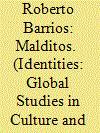

|
|
|
|
|
| Publication |
2009.
|
| Summary/Abstract |
Since the mid-1980s, street gangs known as maras have emerged as a new social entity in Central America. In Honduras, these informal organizations are repeatedly represented in various forms of media as an aberration that is clearly separate from populace and state. Such representations render mareros as entities that possess a radically alien ontology, which is the sole locality of intervention of anti-mara programs. This article analyzes popular media and ethnographic observations to demonstrate that a) rather than being an alien ontology, marero subjectivities are co-constituted through nation and class-forming practices and b) despite such representations, Hondurans of various walks of life routinely subvert attempts to create a tripartite body politic of state-populace-marero. Continued emphasis on the marero as the sole site of intervention and rehabilitation deals with the mara issue at a symptomatic level and fails to address the quotidian processes that give form to this phenomenon.
|
|
|
|
|
|
|
|
|
|
|
|
|
|
|
|
| 5 |
ID:
087520
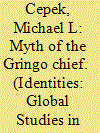

|
|
|
|
|
| Publication |
2009.
|
| Summary/Abstract |
In this article, I investigate the sociocultural grounding and sociopolitical position of Randy Borman, the "gringo chief" of the indigenous Cof n people of Amazonian Ecuador. Born to North American missionary-linguists, Borman grew up in Cof n communities, attended school in urban Ecuador and the United States, and developed into the most important Cof n activist on the global stage. I consider him alongside other ethnically ambiguous leaders of Amazonian political movements, whom anthropologists have described as "messianic" figures. The historians and ethnographers who write about Amazonian messianism debate the relationship between myth and reason in indigenous political action. Using their discussion as a starting point, I propose the concept of "mythical politics," a type of transformative action that concentrates enabling forms of socio-temporal mediation in the shape of individual actors and instantaneous events. I develop my approach through a discussion of the work of Georges Sorel, Georg Luk cs, and Antonio Gramsci, three theorists who debate the role of myth in political mobilization. By applying their insights to the case of Borman, I explore the relationship between myth, mediation, and rationality in Cof n politics and political movements more generally.
|
|
|
|
|
|
|
|
|
|
|
|
|
|
|
|
|
|
|
|
|